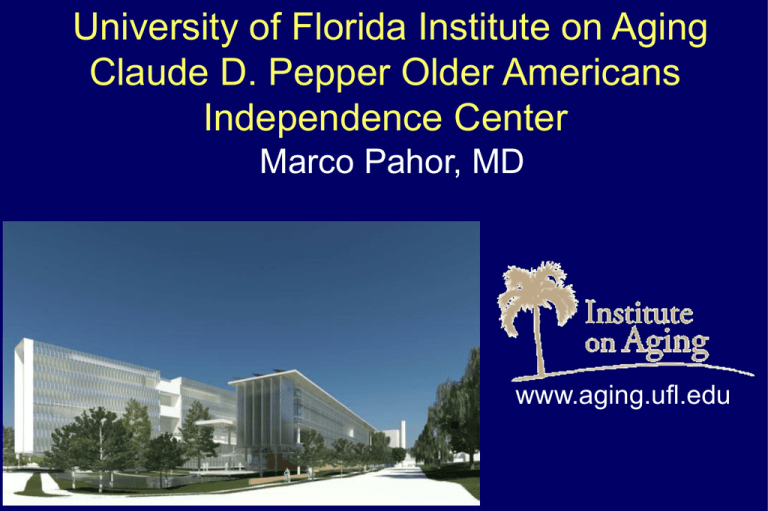Florida OAIC Overview - Claude D Pepper Older Americans
advertisement

University of Florida Institute on Aging Claude D. Pepper Older Americans Independence Center Marco Pahor, MD www.aging.ufl.edu UF Pepper Center 2007-2017 The theme Sarcopenia and prevention of disability is being pursued using an interdisciplinary approach that traverses the entire spectrum of biomedical investigation, including molecular biology, animal studies, clinical research, behavioral sciences, epidemiology and health services UF Pepper Center Mission • To assess the risk factors and better understand the biological mechanisms of physical disability in older adults • To develop and test effective prevention and rehabilitation therapies • To train future leaders and researchers in the arena of aging and disability Organizational Chart Management and Resource Cores Development Cores Pepper Center Leadership and Administration -Dr. Pahor Ms. Crump Research Career Development, Dr. Leeuwenburgh Pilot and Exploratory Studies Dr. Carter Dept. of Aging And Geriatric Research Dr. Pahor VA GRECC Dr. Shorr Clinical Translations Research, Dr. Anton, Dr. Pahor Metabolism & Biomarkers, Dr. Leeuwenburgh Biostatistics, Data Management, Quality Control and Methodology Dr. Doss Recruitment, Adherence, and Retention Dr. Marsiske Cognitive Aging and Memory Clinical Translational Research Program Dr. Cohen University of Florida Institute on Aging OAIC in numbers – 2007 - 2013 • • • • • • • 55 active research projects 68 completed research projects 15 pending grants 50 funded investigators at 16 institutions 45 trainees 13 partnering UF colleges 54,000 sq. ft. of office, research, clinical space Interactions of the Pepper Center with Colleges, Institutes, Centers & Other Organizations Health Sciences Colleges Medicine Public Health & Health Prof. Pharmacy Dentistry Other Colleges Nursing Veterinary Medicine Liberal Arts & Sciences Health & Human Performance Journalism & Communicat. Engineering Institutes & Centers Law Fine Arts Hospitals Cognitive Aging Shands Hospital CTSI Genetics Institute IFAS Pepper Center VA Hospital Cancer Center Brain Institute Emerging Pathogens Inst. VA GRECC Trainees Fellows, Residents, T-K trainees, Junior Faculty, Study Coordinators, Students Community Partners Corporate Partners Institute on Aging Clinical Translational Research Building – NIH C06RR029852 Institute on Aging Health Promotion Research Center UF Institute on Aging - Orlando Lake Nona Academic & Research Center Sarcopenia in the context of the International Classification of Function (ICF) model Biology neural transmission, hormones, proteolysis, autophagy, apoptosis, satellite cells, inflammation, oxidative stress, energy production, blood flow Body (physiological) functions & Body structure Disease Aging metabolic, pulmonary, vascular, immune, organ-specific Environmental Healthcare cost Sarcopenia Muscle atrophy & intramuscular adipose Caretaker Stress Dynapenia Independence Loss of muscle strength Activity limitations Difficulties in executing tasks Participation In life situations Personal factors PAD Diabetes Obesity CKD Liver Failure? Cancer? Sarcopenia, Disease and behaviors Diabetes Obesity Hypoxic diseases CKD Liver Failure Cancer HIV/AIDS Mitochondrial Dysfunction/ Oxidative Stress + + Pro-Inflammatory Cytokines + Apoptosis UnderNutrition + Pro-Inflammatory Cytokines Myofibrillar protein + Catabolic Hormones Obesity Proteolysis Sarcopenia PAD - Perfusion/ Matrix Remodeling - Regeneration Diabetes - CKD HIV/AIDS Liver Failure Hypoxic diseases? Anabolic Hormones/ Growth Factors Denervation PAD Hypoxic diseases - Myocyte Loss Protein Synthesis Amino Acid Availability Diabetes Cancer-anorexia Under-Nutrition Liver Failure Anabolic Hormones/ Growth Factors Physical inactivity Diabetes Obesity COPD? Denervation Diabetes Major Phase 3 randomized controlled trials with disability outcomes in older persons • The Life Study • The TTrial • ASPREE Active Clinical Pilot Studies Study Name (Sponsor) PI Brief Description/ Targeted Population Think-2-Walk (Pepper) Clark The two primary aims are: (1) determine whether peripheral sensory impairment increases the cortical demands of walking, and (2) whether increased cortical demands of walking reduces mobility function in older adults. Apoptosis (Pepper) Leeuwenburgh This study is investigating the role of apoptosis in contributing to sarcopenia and physical impairment in older adults. Stage Recruitment Initiated 101 Contacts: 40 SV1s scheduled Long-term follow-up “Iatrogenic” Disability (IDR) Project (CTSI) Nayfield The Integrated Data Repository (IDR) aggregates Dataset developed data from various clinical and administrative and initial analyses information systems. This study will use the IDR to underway examine comorbidity indices, physical function, and “Iatrogenic disability” in patients hospitalized within the Shands hospital network. Exercise for Depression: The PAMM Study (McKnight) Dotson This project is testing whether aerobic exercise can Recruitment/ improve cognitive and daily functioning of individuals Intervention Initiated with depression, and is using fMRI to explore potential mechanisms for hypothesized effects. Automaticity of walking: Age-related impairment and functional implications (Clark) •To determine if peripheral sensory impairment increases cortical demand of walking and if increased cortical demand of walking reduces mobility function. •Test the hypothesis that electromyographic (EMG) measures are more sensitive than gait parameters to determine cortical demand using a dual-tasking paradigm in older adults. Pending/Emerging Clinical Studies Study Name (Sponsor) Regeneron Trial CIRT (NIH) PI Brief Description/ Targeted Population Manini human monoclonal antibody for inhibiting myostatin that leads to muscle growth Anton Low-dose methotrexate to prevention of cardiovascular events in post-MI, metabolic impaired individuals Mind (Pepper) Buford Development study to investigate relationship of central and peripheral nervous system function with overall physical function Sanofi Inc. Manini Secondary data analyses using existing data (noncontract human subjects) to identify cohorts for sarcopenia research Chores XL Manini NIH R01 to test the hypothesis that aging is (NIH) associated with a difference in the metabolic cost of doing exercise and lifestyle activities Neuroimaging Cohen Creation of a database for metabolic, vascular, & Aging Brain and functional neuroimages of aging brain (McKnight ) Stage Regeneron preparing protocol Investigator Meeting Feb 1st. IRB Development Conference call with Sonofi on 1-17-13 NIH R01 – Council meeting on 1-29-13 RAC/IRB submissions Pepper Junior Scholars and Affiliate Pepper Scholars • • • • • • • S. Someya Aging & Geriatric Research (9% RO1 Age-related hearing loss NIDCD) K. Sibille, Community Dentistry (score 24 K-Award) (pain, OA, telomere biology) D. Clark, Brain Rehabilitation Research Center, VA (VA Career Dev. Award) A. Judge, Physical Therapy (RO1 funded on Basic Muscle Biology, not Aging, yet) V. Dotson, Clinical & Health Psychology, Minority Supplement Funded/R21 pending T. Buford, Aging & Geriatric Research (AHA and ADA grants submitted) AM Joseph, Aging & Geriatric Research (Pepper Pilot Grant Funded) • • • • • • Affiliated Scholars Silvia Tornaletti (Pepper Pilot Grant funded) Phil Efron (Pepper Pilot Grant funded) Natalie Ebner (Department of Psychology) (Submitting RO1 in response to RFA) Mark Wallet (Department of Pathology, Immunology and Laboratory Medicine) Peter Adhihetty (Department of Applied Physiology) RCDC Activities -Roundtable Discussion (Academic Topics/ Grant Review) Combined with CTSI Scholars -Semi-Annual Discussion on Academic Progress -regular mentee/mentor committee meetings & formal feedback -Seminar Series -Workshops Grant Review Specialty Area Workshops -Travel and Pilot Grant Support Induced pluripotent stem cells (iPSCs): potential model to study mechanisms of human aging (Joseph, PhD and Terada, PhD) iPSCs are a type of pluripotent stem cell artificially derived from a non-pluripotent cell - typically an adult somatic cell- by inducing a "forced" expression of specific genes. Terada. Laboratory Investigation (2011) 91, 972–977 Continue: induced pluripotent stem cell (iPSC) study •Establishment and characterization of human iPS cells for ES cell properties including stem cell markers, selfrenewal, and pluripotency •In vitro differentiation of muscle cells from human iPS cells. •Determine the mechanisms of mitochondrial/autophagy alterations of iPS cells derived from individuals of disparate ages. Role of mitochondrial DNA repair in aging and sarcopenia (Silvia Tornaletti, PhD) •The present project aims at identifying molecular mechanisms associated with the age-related features of sarcopenia by studying the relation of mitochondrial DNA stability with DNA repair efficiency and TFAM binding. •We will investigate changes with declining physical function Sepsis/Trauma in the Elderly (Efron, Scientist and ICU MD) Prolonged ICU stays and Manageable Organ Dysfunctions Recurrent Infections (Hits) and Persistent Acute Phase Response & Decreased Lymphocytes Decreased Lean Body Mass – a Wasting Disease and Poor Wound Healing Transfer to LTACs for Indolent Deaths Older Adults 25% discharged to SNFs and 1/3rd dead within one year. Overall Mortality Sespsis patients 20% Elderly Mortality 40% Majority will have Cognitive and Functional Impairments in survivors Immune Mechanisms in the Elderly in Response to Severe Sepsis and Trauma. Animal Models Needed to Understand Trauma/Sepsis syndrome in the elderly •Characterize the emergency myelopoietic response during severe sepsis and severe polytrauma in the aged versus the young adult mouse. •Examine whether increased dysregulation and delay in the emergency myelopoiesis response after sepsis or trauma is responsible, in part, for the immune suppression that leads to increased susceptibility and/or mortality to secondary infections in the elderly as compared to the young. Future Directions •Impact of cognition, memory and pain on physical function and sarcopenia •Mitochondrial function •Pharmacological, nutritional and behavioral interventions to improve/maintain physical and cognitive function (LIFE-Extension Study, LIFE-ARISE prevention of AD, inflammation, vitamin D) •Multimodality intervention studies Our OAIC Leaders M. Pahor, MD S. Anton, PhD C. Carter, PhD R. Cohen, PhD L. Crump, MPH H. Doss, PhD C. Leeuwenburgh, PhD T. Manini, PhD M. Marsiske, PhD S. Nayfield MD Pepper Junior Scholars Our Leaders of Tomorrow D. Clark, PhD T. Buford, PhD V. Dotson, PhD A. Joseph, PhD A. Judge, PhD K. Sibille, PhD S. Someya, PhD

